| [1] |
CHUA L. Memristor-the missing circuit element[J]. IEEE Transactions on Circuit Theory, 1971, 18(5): 507–519. doi: 10.1109/TCT.1971.1083337
|
| [2] |
LI Can, GRAVES C E, SHENG Xia, et al. Analog content-addressable memories with memristors[J]. Nature Communications, 2020, 11(1): 1638. doi: 0.1038/s41467-020-15254-4
|
| [3] |
CAO Qiang, LÜ Weiming, WANG Renshaw, et al. Nonvolatile multistates memories for high-density data storage[J]. ACS Applied Materials & Interfaces, 2020, 12(38): 42449–42471. doi: 10.1021/acsami.0c10184
|
| [4] |
ALI K A, RIZK M, BAGHDADI A, et al. Crossbar memory architecture performing memristor overwrite logic[C]. 2019 26th IEEE International Conference on Electronics, Circuits and Systems (ICECS), Genoa, Italy, 2019: 723–726. doi: 10.1109/ICECS46596.2019.8964910.
|
| [5] |
LUO Li, DONG Zhekang, DUAN Shukai, et al. Memristor-based stateful logic gates for multi-functional logic circuit[J]. IET Circuits, Devices & Systems, 2020, 14(6): 811–818. doi: 10.1049/iet-cds.2019.0422
|
| [6] |
ASCOLI A, SLESAZECK S, MÄHNE H, et al. Nonlinear dynamics of a locally-active memristor[J]. IEEE Transactions on Circuits and Systems I: Regular Papers, 2015, 62(4): 1165–1174. doi: 10.1109/TCSI.2015.2413152
|
| [7] |
CORINTO F and FORTI M. Nonlinear dynamics of memristor oscillators via the flux-charge analysis method[C]. 2017 IEEE International Symposium on Circuits and Systems (ISCAS), Baltimore, USA, 2017. doi: 10.1109/ISCAS.2017.8050989.
|
| [8] |
WU Renping and WANG Chunhua. A new simple chaotic circuit based on memristor[J]. International Journal of Bifurcation and Chaos, 2016, 26(9): 1650145. doi: 10.1142/S0218127416501455
|
| [9] |
WANG Chunhua, XIA Hu, and ZHOU Ling. A memristive hyperchaotic multiscroll jerk system with controllable scroll numbers[J]. International Journal of Bifurcation and Chaos, 2017, 27(6): 1750091. doi: 10.1142/s0218127417500912
|
| [10] |
ZHU Minghao, WANG Chunhua, DENG Quanli, et al. Locally active memristor with three coexisting pinched hysteresis loops and its emulator circuit[J]. International Journal of Bifurcation and Chaos, 2020, 30(13): 2050184. doi: 10.1142/S0218127420501849
|
| [11] |
ZHOU Chao, WANG Chunhua, SUN Yichuang, et al. Weighted sum synchronization of memristive coupled neural networks[J]. Neurocomputing, 2020, 403: 211–233. doi: 10.1016/j.neucom.2020.04.087
|
| [12] |
YAO Wei, WANG Chunhua, SUN Yichuang, et al. Exponential multistability of memristive Cohen-Grossberg neural networks with stochastic parameter perturbations[J]. Applied Mathematics and Computation, 2020, 386: 125483. doi: 10.1016/j.amc.2020.125483
|
| [13] |
LIN Hairong, WANG Chunhua, HONG Qinghui, et al. A multi-stable memristor and its application in a neural network[J]. IEEE Transactions on Circuits and Systems II: Express Briefs, 2020, 67(12): 3472–3476. doi: 10.1109/TCSII.2020.3000492
|
| [14] |
LIN Hairong, WANG Chunhua, SUN Yichuang, et al. Firing multistability in a locally active memristive neuron model[J]. Nonlinear Dynamics, 2020, 100(4): 3667–3683. doi: 10.1007/s11071-020-05687-3
|
| [15] |
LIN Hairong, WANG Chunhua, and TAN Yumei. Hidden extreme multistability with hyperchaos and transient chaos in a Hopfield neural network affected by electromagnetic radiation[J]. Nonlinear Dynamics, 2020, 99(4): 2369–2386. doi: 10.1007/s11071-019-05408-5
|
| [16] |
IELMINI D and WONG H S P. In-memory computing with resistive switching devices[J]. Nature Electronics, 2018, 1(6): 333–343. doi: 10.1038/s41928-018-0092-2
|
| [17] |
CHI Ping, LI Shuangchen, XU Cong, et al. PRIME: A novel processing-in-memory architecture for neural network computation in ReRAM-based main memory[C]. 2016 ACM/IEEE 43rd Annual International Symposium on Computer Architecture (ISCA), Seoul, Korea, 2016: 27–39. doi: 10.1109/ISCA.2016.13.
|
| [18] |
BORGHETTI J, SNIDER G S, KUEKES P J, et al. ‘Memristive’ switches enable ‘stateful’ logic operations via material implication[J]. Nature, 2010, 464(7290): 873–876. doi: 10.1038/nature08940
|
| [19] |
KVATINSKY S, BELOUSOV D, LIMAN S, et al. MAGIC—memristor-aided logic[J]. IEEE Transactions on Circuits and Systems II: Express Briefs, 2014, 61(11): 895–899. doi: 10.1109/TCSII.2014.2357292
|
| [20] |
ALAMGIR Z, BECKMANN K, CADY N, et al. Flow-based computing on nanoscale crossbars: Design and implementation of full adders[C]. 2016 IEEE International Symposium on Circuits and Systems, Montreal, Canada, 2016: 1870–1873.
|
| [21] |
TALATI N, GUPTA S, MANE P, et al. Logic design within memristive memories using memristor-aided loGIC (MAGIC)[J]. IEEE Transactions on Nanotechnology, 2016, 15(4): 635–650. doi: 10.1109/TNANO.2016.2570248
|
| [22] |
LI H, GAO B, CHEN Z, et al. A learnable parallel processing architecture towards unity of memory and computing[J]. Scientific Reports, 2015, 5: 13330. doi: 10.1038/srep13330
|
| [23] |
CHENG Long, ZHANG Meiyun, LI Yi, et al. Reprogrammable logic in memristive crossbar for in-memory computing[J]. Journal of Physics D: Applied Physics, 2017, 50(50): 505102. doi: 10.1088/1361-6463/aa9646
|
| [24] |
KARIMI A and REZAI A. High-performance digital logic implementation approach using novel Memristor-based multiplexer[J]. International Journal of Circuit Theory and Applications, 2019, 47(12): 1933–1947. doi: 10.1002/cta.2712
|
| [25] |
BEN-HUR R, RONEN R, HAJ-ALI A, et al. SIMPLER MAGIC: Synthesis and mapping of in-memory logic executed in a single row to improve throughput[J]. IEEE Transactions on Computer-Aided Design of Integrated Circuits and Systems, 2020, 39(10): 2434–2447. doi: 10.1109/TCAD.2019.2931188
|
| [26] |
LIU Xiaoxiao, MAO Mengjie, LIU Beiye, et al. Harmonica: A framework of heterogeneous computing systems with memristor-based neuromorphic computing accelerators[J]. IEEE Transactions on Circuits and Systems I: Regular Papers, 2016, 63(5): 617–628. doi: 10.1109/TCSI.2016.2529279
|
| [27] |
HALAWANI Y, MOHAMMAD B, Al-QUTAYRI M, et al. A re-configurable memristor array structure for in-memory computing applications[C]. 2018 30th International Conference on Microelectronics (ICM), Sousse, Tunisia, 2018: 160–163. doi: 10.1109/ICM.2018.8704111.
|
| [28] |
ZHANG Xunming, ZHANG Quan, YANG Jianguo, et al. Novel hybrid computing architecture with memristor-based processing-in-memory for data-intensive applications[C]. 2018 14th IEEE International Conference on Solid-State and Integrated Circuit Technology (ICSICT), Qingdao, China, 2018: 1–3. doi: 10.1109/ICSICT.2018.8564888.
|
| [29] |
ALAM M R, NAJAFI M H, and NEJAD N T. Exact stochastic computing multiplication in memristive memory[J]. IEEE Design & Test, To be published. doi: 10.1109/MDAT.2021.3051296
|
| [30] |
KOLMS T, LANG C, WALDNER A, et al. Towards in-memory computing: Arithmetic operations on real memristors[C]. The IECON 2020 the 46th Annual Conference of the IEEE Industrial Electronics Society, Singapore, 2020: 2296–2301. doi: 10.1109/IECON43393.2020.9254441.
|
| [31] |
ZANOTTI T, PUGLISI F M, and PAVAN P. Reconfigurable smart in-memory computing platform supporting logic and binarized neural networks for low-power edge devices[J]. IEEE Journal on Emerging and Selected Topics in Circuits and Systems, 2020, 10(4): 478–487. doi: 10.1109/JETCAS.2020.3030542
|
| [32] |
CHENG Long, LI Yi, YIN Kangsheng, et al. Functional demonstration of a memristive arithmetic logic unit (MemALU) for in-memory computing[J]. Advanced Functional Materials, 2019, 29(49): 1905660. doi: 10.1002/adfm.201905660
|
| [33] |
DAI Lan, GUO Hong, LIN Qipeng, et al. An in-memory-computing design of multiplier based on multilevel-cell of resistance switching random access memory[J]. Chinese Journal of Electronics, 2018, 27(6): 1151–1157. doi: 10.1049/cje.2018.08.006
|
| [34] |
ZHOU Yaxiong, LI Yi, DUAN Nian, et al. Boolean and sequential logic in a one-memristor-one-resistor (1M1R) structure for in-memory computing[J]. Advanced Electronic Materials, 2018, 4(9): 1800229. doi: 10.1002/aelm.201800229
|
| [35] |
HALAWANI Y, MOHAMMAD B, LEBDEH M A, et al. ReRAM-based in-memory computing for search engine and neural network applications[J]. IEEE Journal on Emerging and Selected Topics in Circuits and Systems, 2019, 9(2): 388–397. doi: 10.1109/JETCAS.2019.2909317
|
| [36] |
CHU M, KIM B, PARK S, et al. Neuromorphic hardware system for visual pattern recognition with memristor array and CMOS neuron[J]. IEEE Transactions on Industrial Electronics, 2015, 62(4): 2410–2419. doi: 10.1109/TIE.2014.2356439
|
| [37] |
LI Can, BELKIN D, LI Yunning, et al. Efficient and self-adaptive in-situ learning in multilayer memristor neural networks[J]. Nature Communications, 2018, 9(1): 2385. doi: 10.1038/s41467-018-04484-2
|
| [38] |
DUAN Qingxi, JING Zhaokun, ZOU Xiaolong, et al. Spiking neurons with spatiotemporal dynamics and gain modulation for monolithically integrated memristive neural networks[J]. Nature Communications, 2020, 11(1): 3399. doi: 10.1038/s41467-020-17215-3
|
| [39] |
YAO Peng, WU Huaqiang, GAO Bin, et al. Fully hardware-implemented memristor convolutional neural network[J]. Nature, 2020, 577(7792): 641–646. doi: 10.1038/s41586-020-1942-4
|
| [40] |
BALAJI A, DAS A, WU Yuefeng, et al. Mapping spiking neural networks to neuromorphic hardware[J]. IEEE Transactions on Very Large Scale Integration (VLSI) Systems, 2020, 28(1): 76–86. doi: 10.1109/TVLSI.2019.2951493
|
| [41] |
TAN Hongwei, MAJUMDAR S, QIN Qihang, et al. Mimicking neurotransmitter release and long-term plasticity by oxygen vacancy migration in a tunnel junction memristor[J]. Advanced Intelligent Systems, 2019, 1(2): 1900036. doi: 10.1002/aisy.201900036
|
| [42] |
WIJESINGHE P, ANKIT A, SENGUPTA A, et al. An all-memristor deep spiking neural computing system: A step toward realizing the low-power stochastic brain[J]. IEEE Transactions on Emerging Topics in Computational Intelligence, 2018, 2(5): 345–358. doi: 10.1109/TETCI.2018.2829924
|
| [43] |
ZHANG Yang, WANG Xiaoping, and FRIEDMAN E G. Memristor-based circuit design for multilayer neural networks[J]. IEEE Transactions on Circuits and Systems I: Regular Papers, 2018, 65(2): 677–686. doi: 10.1109/TCSI.2017.2729787
|
| [44] |
ZHAO Yongyan, SUN Wuji, WANG Jia, et al. All‐inorganic ionic polymer-based memristor for high-performance and flexible artificial synapse[J]. Advanced Functional Materials, 2020, 30(39): 2004245. doi: 10.1002/adfm.202004245
|
| [45] |
GREENBERG-TOLEDO T, MAZOR R, HAJ-ALI A, et al. Supporting the momentum training algorithm using a memristor-based synapse[J]. IEEE Transactions on Circuits and Systems I: Regular Papers, 2019, 66(4): 1571–1583. doi: 10.1109/TCSI.2018.2888538
|
| [46] |
SUN Shengyang, XU Hui, LI Jiwei, et al. Cascaded architecture for memristor crossbar array based larger-scale neuromorphic computing[J]. IEEE Access, 2019, 7: 61679–61688. doi: 10.1109/ACCESS.2019.2915787
|
| [47] |
HU Lingxiang, YANG Jing, WANG Jingrui, et al. All‐optically controlled memristor for optoelectronic neuromorphic computing[J]. Advanced Functional Materials, 2021, 31(4): 2005582. doi: 10.1002/adfm.202005582
|
| [48] |
LI Haoyang, HUANG Xiaodi, YUAN Junhui, et al. Controlled memory and threshold switching behaviors in a heterogeneous memristor for neuromorphic computing[J]. Advanced Electronic Materials, 2020, 6(8): 2000309. doi: 10.1002/aelm.202000309
|
| [49] |
BAE W and YOON K J. Weight update generation circuit utilizing phase noise of integrated complementary metal-oxide-semiconductor ring oscillator for memristor crossbar array neural network-based stochastic learning[J]. Advanced Intelligent Systems, 2020, 2(5): 2000011. doi: 10.1002/aisy.202000011
|
| [50] |
ZHU Bowen, WANG Hong, LIU Yaqing, et al. Skin-inspired haptic memory arrays with an electrically reconfigurable architecture[J]. Advanced Materials, 2016, 28(8): 1559–1566. doi: 10.1002/adma.201504754
|
| [51] |
ZHANG Chen, YE Wenbin, ZHOU Kui, et al. Bioinspired artificial sensory nerve based on nafion memristor[J]. Advanced Functional Materials, 2019, 29(20): 1808783. doi: 10.1002/adfm.201808783
|
| [52] |
JIANG Chengming, LI Qikun, SUN Nan, et al. A high-performance bionic pressure memory device based on piezo-OLED and piezo-memristor as luminescence-fish neuromorphic tactile system[J]. Nano Energy, 2020, 77: 105120. doi: 10.1016/j.nanoen.2020.105120
|
| [53] |
HE Ke, LIU Yaqing, WANG Ming, et al. An artificial somatic reflex arc[J]. Advanced Materials, 2020, 32(4): 1905399. doi: 10.1002/adma.201905399
|
| [54] |
LIU Fengyuan, TAUBE W, YOGESWARAN N, et al. Transforming the short-term sensing stimuli to long-term e-skin memory[C]. 2017 IEEE SENSORS, Glasgow, UK, 2017: 1–3. doi: 10.1109/ICSENS.2017.8234187.
|
| [55] |
SUN Yihui, ZHENG Xin, YAN Xiaoqin, et al. Bioinspired tribotronic resistive switching memory for self-powered memorizing mechanical stimuli[J]. ACS Applied Materials & Interfaces, 2017, 9(50): 43822–43829. doi: 10.1021/acsami.7b15269
|
| [56] |
WANG Zilu, HONG Qinghui, and WANG Xiaoping. Memristive circuit design of emotional generation and evolution based on skin-like sensory processor[J]. IEEE Transactions on Biomedical Circuits and Systems, 2019, 13(4): 631–644. doi: 10.1109/TBCAS.2019.2923055
|
| [57] |
WAN Changjin, CAI Pingqiang, GUO Xintong, et al. An artificial sensory neuron with visual-haptic fusion[J]. Nature Communications, 2020, 11: 4602. doi: 10.1038/s41467-020-18375-y
|
| [58] |
RAHMAN M A, WALIA S, NAZNEE S, et al. Artificial somatosensors: Feedback receptors for electronic skins[J]. Advanced Intelligent Systems, 2020, 2(11): 2000094. doi: 10.1002/aisy.202000094
|
| [59] |
LIU Haitao, HUA Qilin, YU Ruomeng, et al. A bamboo-like GaN microwire-based piezotronic memristor[J]. Advanced Functional Materials, 2016, 26(29): 5307–5314. doi: 10.1002/adfm.201600962
|
| [60] |
KIM Y, CHORTOS A, XU Wentao, et al. A bioinspired flexible organic artificial afferent nerve[J]. Science, 2018, 360(6392): 998–1003. doi: 10.1126/science.aao0098
|
| [61] |
EMBORAS A, GOYKHMAN I, DESIATOV B, et al. Nanoscale plasmonic memristor with optical readout functionality[J]. Nano Letters, 2013, 13(12): 6151–6155. doi: 10.1021/nl403486x
|
| [62] |
TAN Hongwei, LIU Gang, ZHU Xiaojian, et al. An optoelectronic resistive switching memory with integrated demodulating and arithmetic functions[J]. Advanced Materials, 2015, 27(17): 2797–2803. doi: 10.1002/adma.201500039
|
| [63] |
SEO S, JO S H, KIM S, et al. Artificial optic-neural synapse for colored and color-mixed pattern recognition[J]. Nature Communications, 2018, 9(1): 5106. doi: 10.1038/s41467-018-07572-5
|
| [64] |
ZHOU Feichi, ZHOU Zheng, CHEN Jiewei, et al. Optoelectronic resistive random access memory for neuromorphic vision sensors[J]. Nature Nanotechnology, 2019, 14(8): 776–782. doi: 10.1038/s41565-019-0501-3
|
| [65] |
YANG Lin, SINGH M, SHEN S W, et al. Transparent and flexible inorganic perovskite photonic artificial synapses with dual-mode operation[J]. Advanced Functional Materials, 2020, 31(6): 2008259. doi: 10.1002/adfm.202008259
|
| [66] |
LORENZI P, SUCRE V, ROMANO G, et al. Memristor based neuromorphic circuit for visual pattern recognition[C]. 2015 International Conference on Memristive Systems (MEMRISYS), Paphos, Cyprus, 2015: 1–2. doi: 10.1109/MEMRISYS.2015.7378387.
|
| [67] |
SARKAR M, CHOWDHURY A, ARKA A I, et al. A new supervised learning approach for visual pattern recognition using discrete circuit elements and memristor array[C]. The TENCON 2017 – 2017 IEEE Region 10 Conference, Penang, Malaysia, 2017: 223–228. doi: 10.1109/TENCON.2017.8227866.
|
| [68] |
ASCOLI A, MESSARIS I, TETZLAFF R, et al. CNNs with bistable-like non-volatile memristors: A novel mem-computing paradigm for the IoT era[C]. 2018 25th IEEE International Conference on Electronics, Circuits and Systems (ICECS), Bordeaux, France, 2018: 541–544. doi: 10.1109/ICECS.2018.8617924.
|
| [69] |
DONG Zhekang, LAI C S, HE Yufei, et al. Hybrid dual-CMOS/memristor synapse-based neural network with its applications in image super-resolution[J]. IET Circuits, Devices & Systems, 2019, 13(8): 1241–1248. doi: 10.1049/iet-cds.2018.5062
|
| [70] |
HALAWANI Y, MOHAMMAD B, AL-QUTAYRI M, et al. Memristor-based hardware accelerator for image compression[J]. IEEE Transactions on Very Large Scale Integration (VLSI) Systems, 2018, 26(12): 2749–2758. doi: 10.1109/TVLSI.2018.2835572
|
| [71] |
WU Lindong, WANG Zongwei, WANG Bowen, et al. Emulation of biphasic plasticity in retinal electrical synapses for light-adaptive pattern pre-processing[J]. Nanoscale, 2021, 13(6): 3483–3492. doi: 10.1039/d0nr08012h
|
| [72] |
LIN Ya, WANG Cong, REN Yanyun, et al. Analog-digital hybrid memristive devices for image pattern recognition with tunable learning accuracy and speed[J]. Small Methods, 2019, 3(10): 1900160. doi: 10.1002/smtd.201900160
|
| [73] |
SUN Yilin, QIAN Liu, XIE Dan, et al. Photoelectric synaptic plasticity realized by 2D perovskite[J]. Advanced Functional Materials, 2019, 29(28): 1902538. doi: 10.1002/adfm.201902538
|
| [74] |
YANG C M, CHEN T C, VERMA D, et al. Bidirectional all-optical synapses based on a 2D Bi2O2Se/graphene hybrid structure for multifunctional optoelectronics[J]. Advanced Functional Materials, 2020, 30(30): 2001598. doi: 10.1002/adfm.202001598
|
| [75] |
WANG Xin, LU Yang, ZHANG Junyao, et al. Highly sensitive artificial visual array using transistors based on porphyrins and semiconductors[J]. Small, 2021, 17(2): 2005491. doi: 10.1002/smll.202005491
|
| [76] |
HSU H T, YANG Donglin, WIYANTO L D, et al. Red-light-stimulated photonic synapses based on non-volatile perovskite-based photomemory[J]. Advanced Photonics Research, 2021: 2000185. doi: 10.1002/adpr.202000185
|
| [77] |
ZHANG Lei, YU Hao, XIAO Cancheng, et al. Building light stimulated synaptic memory devices for visual memory simulation[J]. Advanced Electronic Materials, 2021, 7(1): 2000945. doi: 10.1002/aelm.202000945
|
| [78] |
DONG Zhekang, LAI C S, QI Donglian, et al. A general memristor-based pulse coupled neural network with variable linking coefficient for multi-focus image fusion[J]. Neurocomputing, 2018, 308: 172–183. doi: 10.1016/j.neucom.2018.04.066
|
| [79] |
NYENKE C and DONG Lixin. Sensing ambient oxygen using a W/CuxO/Cu memristor[C]. The 10th IEEE International Conference on Nano/Micro Engineered and Molecular Systems, Xi’an, China, 2015: 254–258. doi: 10.1109/NEMS.2015.7147421.
|
| [80] |
SHULAKER M M, HILLS G, PARK R S, et al. Three-dimensional integration of nanotechnologies for computing and data storage on a single chip[J]. Nature, 2017, 547(7661): 74–78. doi: 10.1038/nature22994
|
| [81] |
IWATA T, ONO K, YOSHIKAWA T, et al. Gas discrimination based on single-device extraction of transient sensor response by a MetalOxide memristor toward olfactory sensor array[C]. 2019 IEEE SENSORS, Montreal, Canada, 2019: 1–4. doi: 10.1109/SENSORS43011.2019.8956826.
|
| [82] |
ADEYEMO A, JABIR A, MATHEW J, et al. Reliable gas sensing with memristive array[C]. 2017 IEEE 23rd International Symposium on On-Line Testing and Robust System Design (IOLTS), Thessaloniki, Greece, 2017: 244–246.
|
| [83] |
KHANDELWAL S, BALA A, GUPTA V, et al. Fault modeling and simulation of memristor based gas sensors[C]. 2019 IEEE 25th International Symposium on On-Line Testing and Robust System Design (IOLTS), Rhodes, Greece, 2019: 58–59. doi: 10.1109/IOLTS.2019.8854459.
|
| [84] |
WEN Changbao, HONG Jitong, RU Feng, et al. A novel memristor-based gas cumulative flow sensor[J]. IEEE Transactions on Industrial Electronics, 2019, 66(12): 9531–9538. doi: 10.1109/TIE.2019.2891436
|
| [85] |
VIDIŠ M, PLECENIK T, MOŠKO M, et al. Gasistor: A memristor based gas-triggered switch and gas sensor with memory[J]. Applied Physics Letters, 2019, 115(9): 093504. doi: 10.1063/1.5099685
|
| [86] |
SHAH J, BARANGI M, and MAZUMDER P. Memristor crossbar memory for hybrid ultra low power hearing aid speech processor[C]. 2013 13th IEEE International Conference on Nanotechnology (IEEE-NANO 2013), Beijing, China, 2013: 83–86. doi: 10.1109/NANO.2013.6720867.
|
| [87] |
SALEH Q, MERKEL C, KUDITHIPUDI D, et al. Memristive computational architecture of an echo state network for real-time speech-emotion recognition[C]. 2015 IEEE Symposium on Computational Intelligence for Security and Defense Applications (CISDA), Verona, USA, 2015: 1–5. doi: 10.1109/CISDA.2015.7208624.
|
| [88] |
RAFIQUE M A, LEE B G, and JEON M. Hybrid neuromorphic system for automatic speech recognition[J]. Electronics Letters, 2016, 52(17): 1428–1430. doi: 10.1049/el.2016.0975
|
| [89] |
WANG Wei, PEDRETTI G, MILO V, et al. Learning of spatiotemporal patterns in a spiking neural network with resistive switching synapses[J]. Science Advances, 2018, 4(9): eaat4752. doi: 10.1126/sciadv.aat4752
|
| [90] |
SUN Linfeng, ZHANG Yishu, HWANG G, et al. Synaptic computation enabled by joule heating of single-layered semiconductors for sound localization[J]. Nano Letters, 2018, 18(4): 3229–3234. doi: 10.1021/acs.nanolett.8b00994
|
| [91] |
LI Can, HAN Lili, JIANG Hao, et al. Three-dimensional crossbar arrays of self-rectifying Si/SiO2/Si memristors[J]. Nature Communications, 2017, 8: 15666. doi: 10.1038/ncomms15666
|
| [92] |
BISHOP M D, WONG H S P, MITRA S, et al. Monolithic 3-D integration[J]. IEEE Micro, 2019, 39(6): 16–27. doi: 10.1109/MM.2019.2942982
|
| [93] |
LIN Peng, LI Can, WANG Zhongrui, et al. Three-dimensional memristor circuits as complex neural networks[J]. Nature Electronics, 2020, 3(4): 225–232. doi: 10.1038/s41928-020-0397-9
|
| [94] |
WANG Tianyu, MENG Jialin, CHEN Lin, et al. Flexible 3D memristor array for binary storage and multi‐states neuromorphic computing applications[J]. InfoMat, 2021, 3(2): 212–221. doi: 10.1002/inf2.12158
|
| [95] |
AN Hongyu, EHSAN M A, ZHOU Zhen, et al. Monolithic 3D neuromorphic computing system with hybrid CMOS and memristor-based synapses and neurons[J]. Integration, 2019, 65: 273–281. doi: 10.1016/j.vlsi.2017.10.009
|
| [96] |
SUN W, CHOI S, KIM B, et al. Three-dimensional (3D) vertical resistive random-access memory (VRRAM) synapses for neural network systems[J]. Materials, 2019, 12(20): 3451. doi: 10.3390/ma12203451
|
| [97] |
FERNANDO B R, QI Yangjie, YAKOPCIC C, et al. 3D memristor crossbar architecture for a multicore neuromorphic system[C]. 2020 International Joint Conference on Neural Networks (IJCNN), Glasgow, UK, 2020. doi: 10.1109/IJCNN48605.2020.9206929.
|






 下载:
下载:
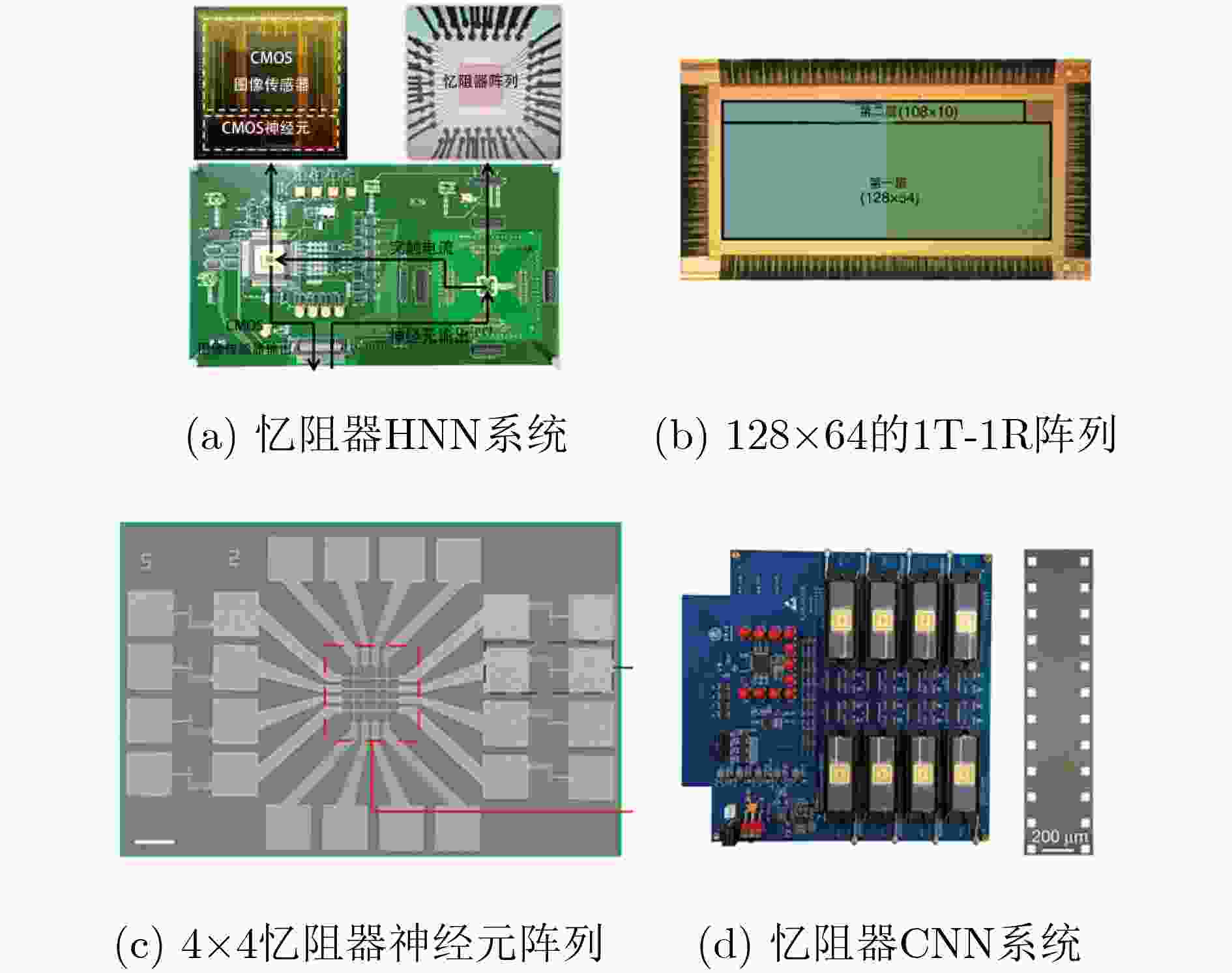
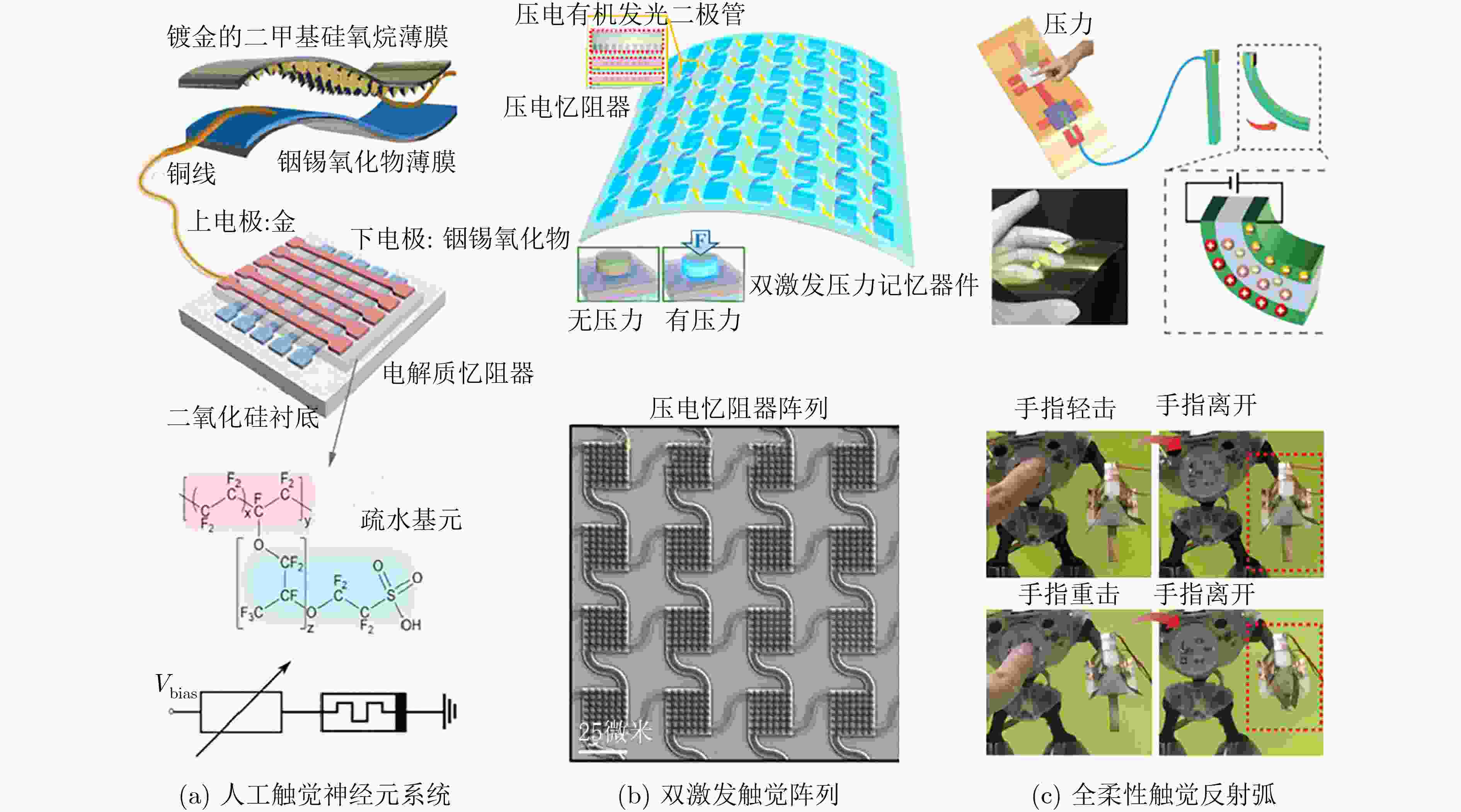
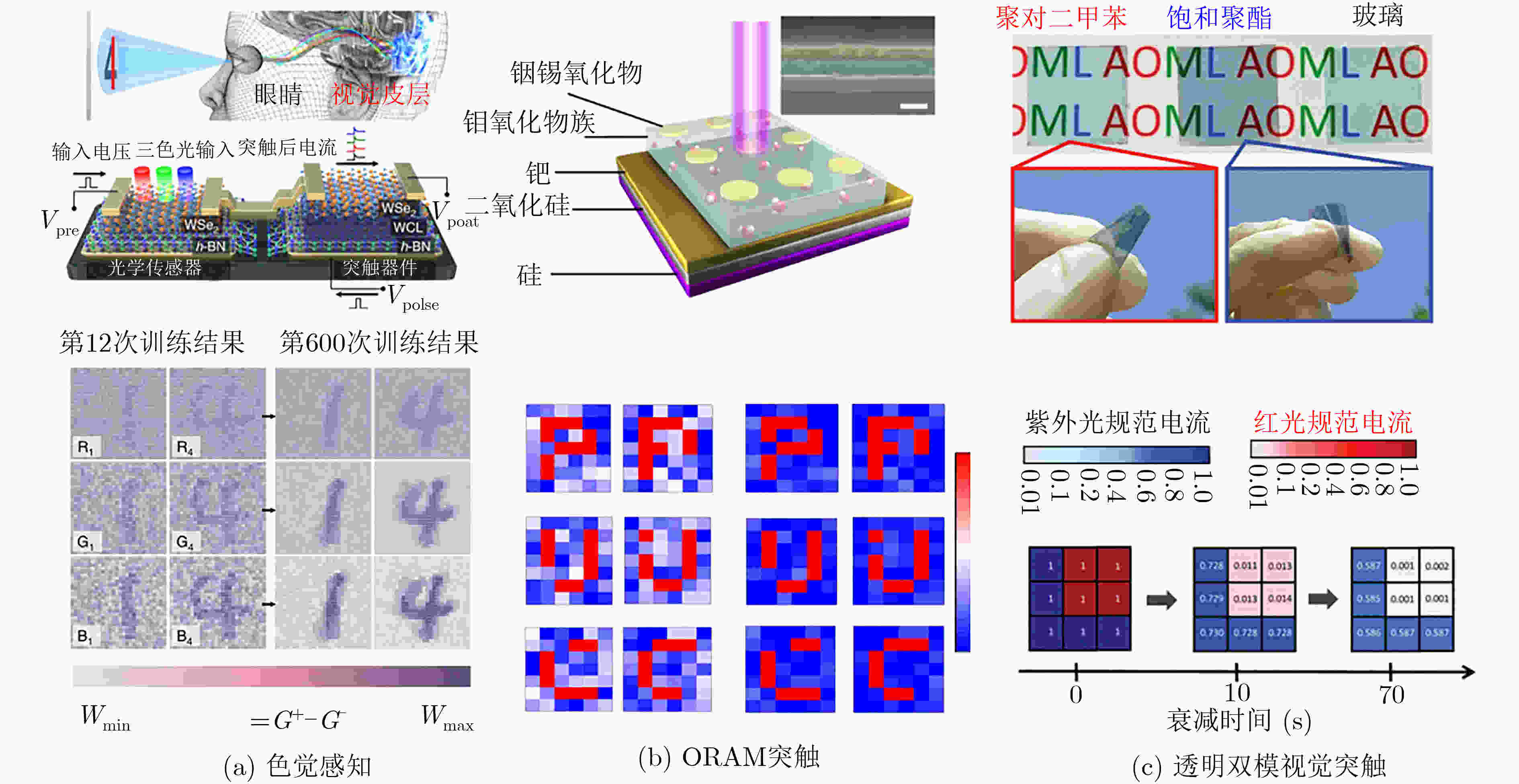
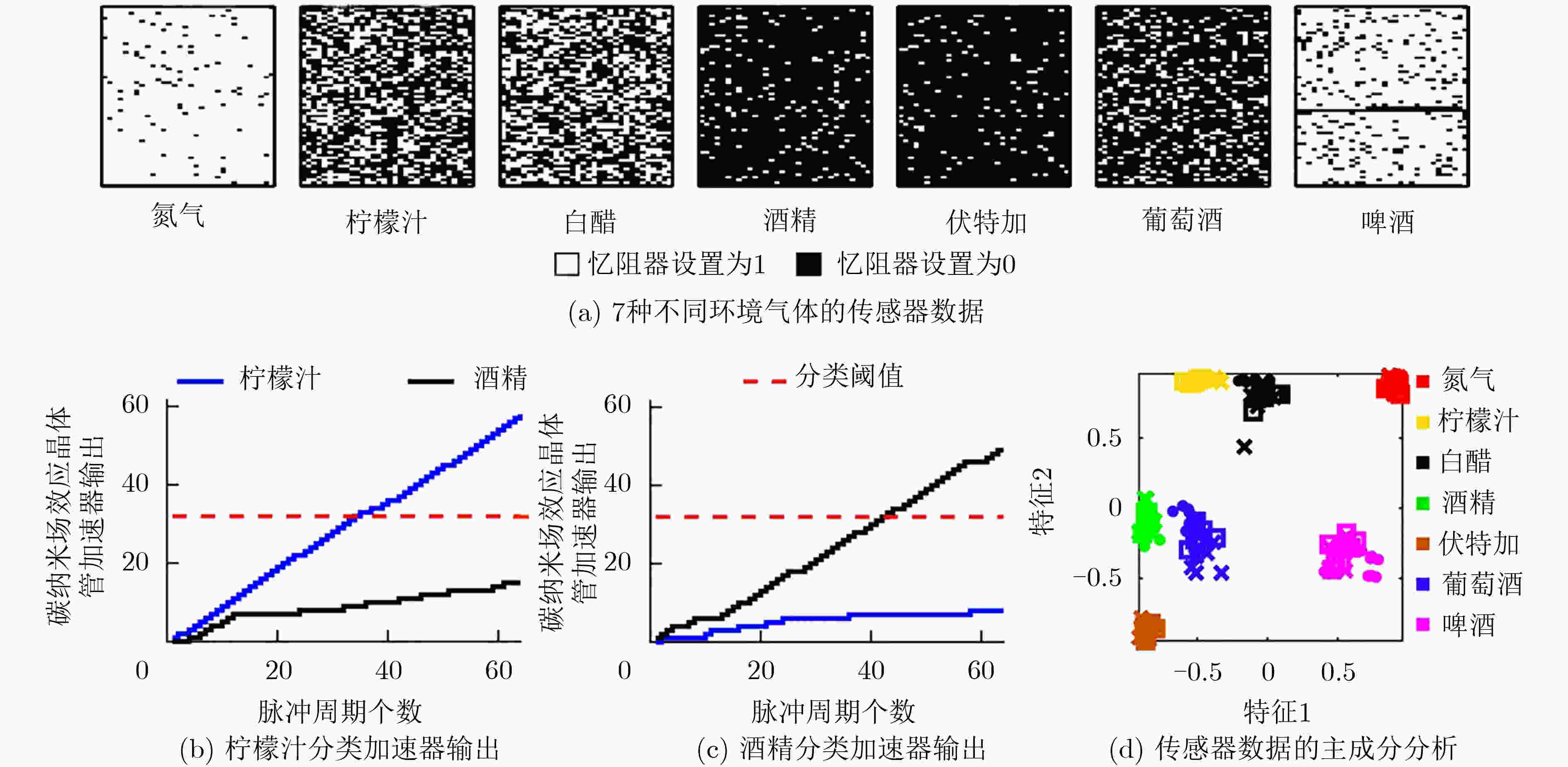
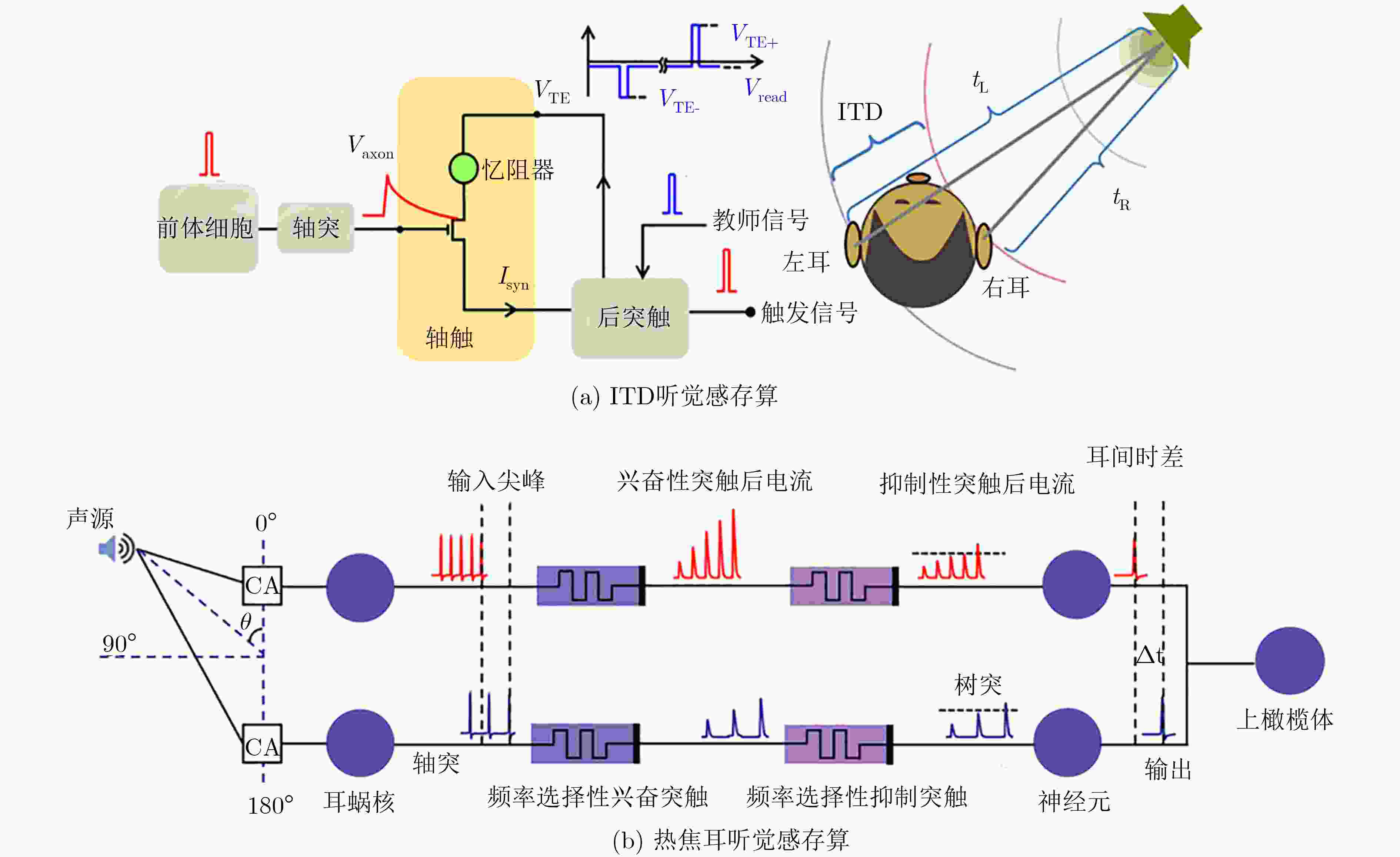
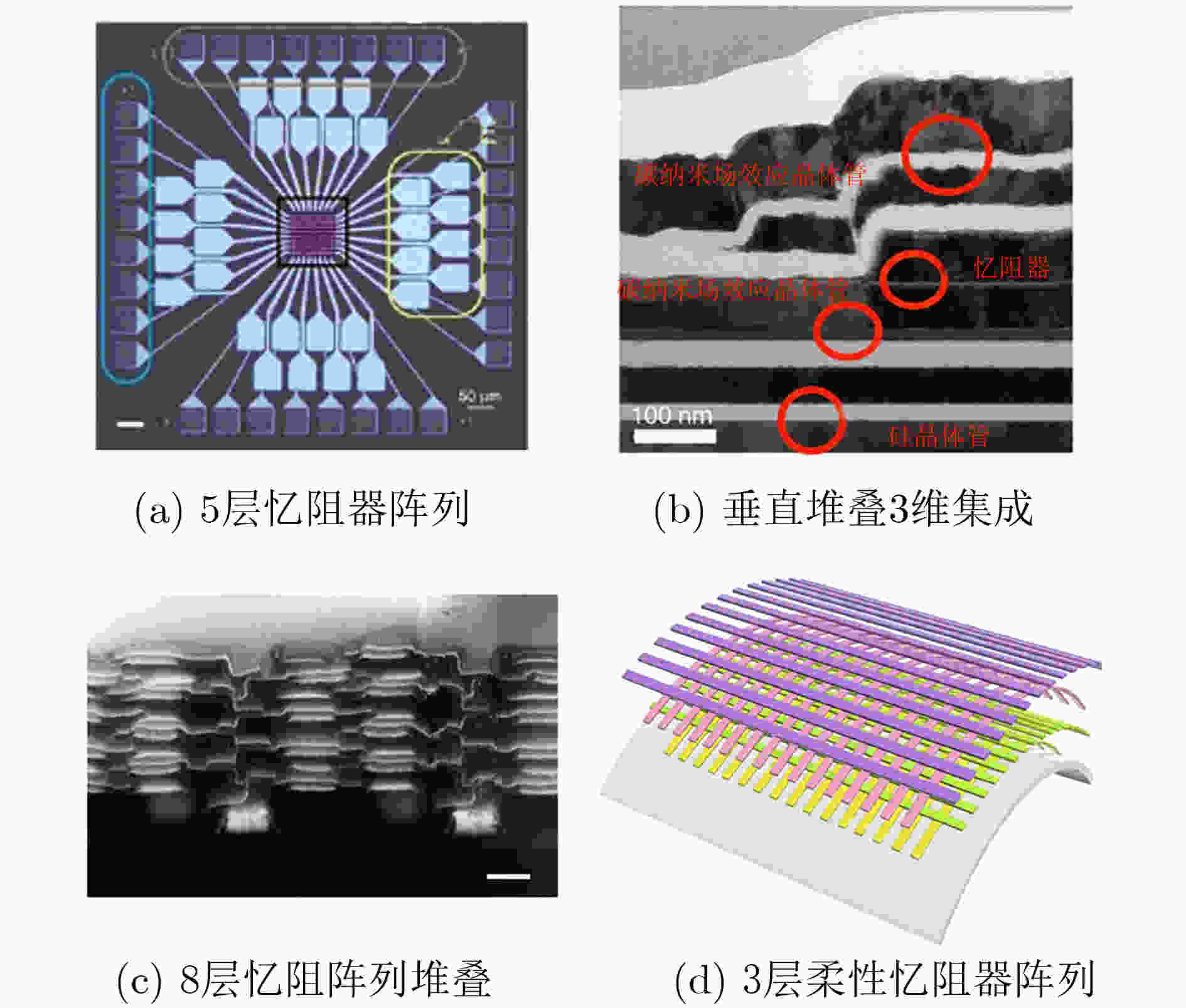


 下载:
下载:
